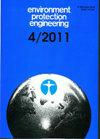Study on activated sludge flocs morphology and composition in a full-scale wastewater treatment plant in Poland
IF 0.4
4区 环境科学与生态学
Q4 ENGINEERING, ENVIRONMENTAL
引用次数: 6
Abstract
This work is a comprehensive study of a full-scale municipal wastewater treatment plant (WWTP) in the city of Zgierz (Poland) aiming at the estimation of the impact of seasonal changes of temperature on flocs morphology, biomass concentration, quantity of filamentous bacteria, content of polyhydroxybutyrate (PHB) and composition of microinvertebrates in the activated sludge system. Two short-term measurement campaigns, in winter and in summer, were carried out under dry weather conditions. It occurred that lower temperatures (11.1–14.6 °C) had hardly any effect on flocs size or concentration of activated sludge biomass in the full-scale activated sludge system treating municipal wastewater. They did not aggravate the biosynthesis of PHB either. However, decreasing temperature favored the growth of filamentous bacteria and led to the elevation of the sludge volume index (SVI). In spite of this, it did not induce any bulking events. Irrespective of the season, the groups of crawling ciliates, attached ciliates and testate amoebae, indicating good performance of the full-scale plant tested, were predominant.波兰某污水处理厂活性污泥絮凝体形态及组成研究
这项工作是对波兰Zgierz市的一个大型城市污水处理厂(WWTP)进行的一项综合研究,旨在估计温度的季节性变化对活性污泥系统中絮凝体形态、生物量浓度、丝状细菌数量、聚羟基丁酸盐(PHB)含量和微型无脊椎动物组成的影响。在干燥的天气条件下,在冬季和夏季进行了两次短期测量活动。在处理城市污水的全尺寸活性污泥系统中,较低温度(11.1 ~ 14.6℃)对絮凝体大小和活性污泥生物量浓度几乎没有影响。它们也没有加剧PHB的生物合成。温度降低有利于丝状菌的生长,导致污泥体积指数(SVI)升高。尽管如此,它并没有引起任何膨胀事件。无论季节如何,爬行纤毛虫、附着纤毛虫和睾丸变形虫的群体都占主导地位,表明全尺寸植物的良好表现。
本文章由计算机程序翻译,如有差异,请以英文原文为准。
求助全文
约1分钟内获得全文
求助全文
来源期刊

Environment Protection Engineering
环境科学-工程:环境
CiteScore
0.80
自引率
0.00%
发文量
9
审稿时长
12 months
期刊介绍:
Water purification, wastewater treatment, water reuse, solid waste disposal, gas emission abatement, systems of water and air pollution control, soil remediation.
 求助内容:
求助内容: 应助结果提醒方式:
应助结果提醒方式:


